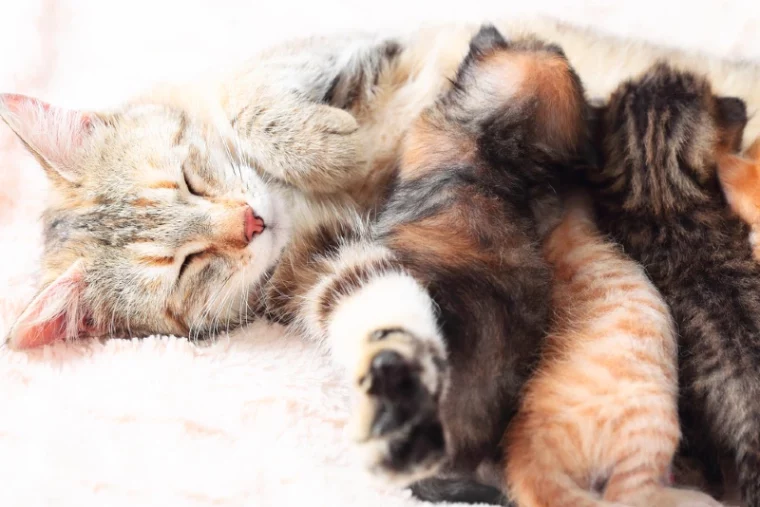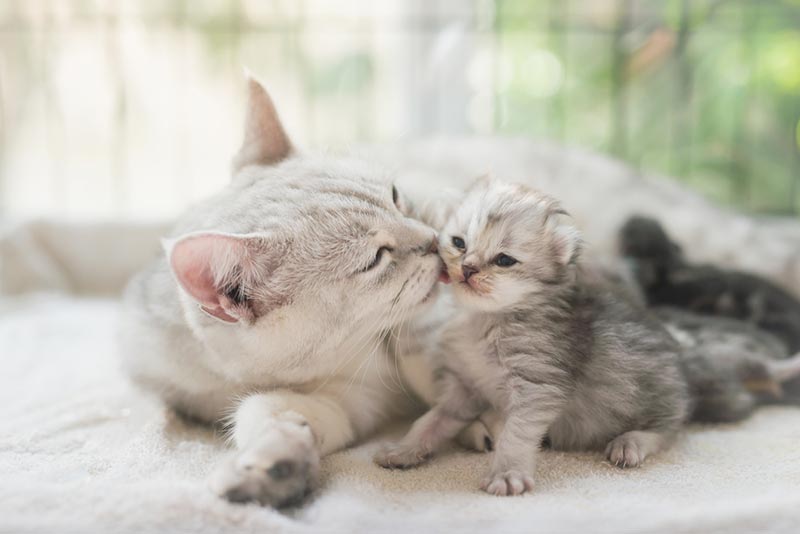
Cats are considered to be aloof, independent creatures that only care about the person who feeds them. But that couldn’t be further from the truth. We know cats and humans form very strong bonds, but what about their kittens? Do cats love their kittens?
The simple answer is yes. Mother cats love their kittens and work hard to keep their young ones safe in the wild. Domestic cats might not have to fight off predators, but they do care for their kittens and work to keep them safe. Cats love their kittens, but not in the same way that humans love their babies. We’ll discuss this and more below, so join us.
Do Cats and Kittens Recognize Each Other?
Cats aren’t the same as humans and don’t recognize people or other animals by their faces. Cats recognize their kittens mainly using their sense of smell and hearing. Acoustic communication plays an essential role in mother-kitten recognition.
A 2016 study proved that kittens learn their mother’s chirps, respond positively to these, and are able to distinguish them from the vocalizations of other mothers. They can identify their kittens by the way they cry, and kittens also can identify their mothers.

Can a Cat Dislike Her Kittens?
No, generally speaking, cats do not dislike or avoid their kittens. On rare occasions, mother cats (queens) may reject kittens that are unhealthy or unresponsive. However, if a whole litter is rejected, it is likely due to illness of the queen or stressful environmental conditions. These kittens need to have a health check by a vet as soon as possible and to be hand-reared.
The fact that a cat is a poor mother for her first litter does not mean that she won’t be able to be an excellent mom for future litters. It is normal for mother cats to start pushing the kittens out of the nest before they reach 12 weeks of age, so to speak. This isn’t because they hate their kittens or are tired of them; it’s their way of teaching them to be independent and capable of making it on their own.
What Do Kittens Learn From Their Mothers?
A cat’s behavior throughout their life is largely influenced by how they interacted with their mother and what they learned from her as a kitten.
Kittens that lack close contact with their mothers during their first 8 weeks of life have difficulties interacting with other cats. They also learn how to respond to people. If their mothers stay calm and show positive behavior towards people, kittens are likely to act similarly, allowing them to form strong attachment bonds with humans.
Conclusion
Science has demonstrated that queens not only look after their kittens but they form attachment bonds with them. Cats have a strong instinct to protect their young and will become aggressive and fierce if they think the kittens are threatened.
They recognize their young, and some mother cats have even been known to adopt other cats’ kittens if the mother has disappeared, become lost, or died. So, cats do love their kittens in their unique cat style. They love, protect, and nurture them until the time comes for them to leave the nest.
Related read:
- Why Did My Cat Only Have One Kitten? 4 Vet Reviewed Reasons
- How Do Cats Show Submission? 6 Common Gestures
Featured Image Credit: Rashid Valitov, Shutterstock








